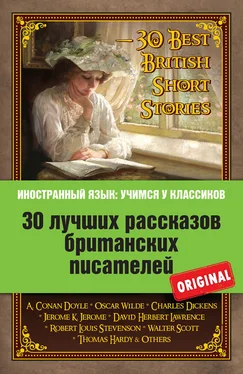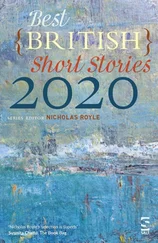I said: ‘Look here, it’s all very well, but you simply can’t know all this; there hasn’t been time – it only happened last night.’
He said: ‘Last night be blowed! It all happened in February, nineteen nineteen. The people you’ve described have been dead for years.’
I said: ‘Oh!’
And to think that I might have stuck to that nine pounds!
Stacy Aumonier
Where Was Wych Street?
In the public bar of the Wagtail, in Wapping, four men and a woman were drinking beer and discussing diseases. It was not a pretty subject, and the company was certainly not a handsome one. It was a dark November evening, and the dingy lighting of the bar seemed but to emphasize the bleak exterior. Drifts of fog and damp from without mingled with the smoke of shag. The sanded floor was kicked into a muddy morass not unlike the surface of the pavement. An old lady down the street had died from pneumonia the previous evening, and the event supplied a fruitful topic of conversation. The things that one could get! Everywhere were germs eager to destroy one. At any minute the symptoms might break out. And so – one foregathered in a cheerful spot amidst friends, and drank forgetfulness.
Prominent in this little group was Baldwin Meadows, a sallow-faced villain with battered features and prominent cheek-bones, his face cut and scarred by a hundred fights. Ex-seaman, ex-boxer, ex-fish-porter – indeed, to every one’s knowledge, ex-everything. No one knew how he lived. By his side lurched an enormous coloured man who went by the name of Harry Jones. Grinning above a tankard sat a pimply-faced young man who was known as The Agent. Silver rings adorned his fingers. He had no other name, and most emphatically no address, but he ‘arranged things’ for people, and appeared to thrive upon it in a scrambling, fugitive manner. The other two people were Mr. and Mrs. Dawes. Mr. Dawes was an entirely negative person, but Mrs. Dawes shone by virtue of a high, whining, insistent voice, keyed to within half a note of hysteria.
Then, at one point, the conversation suddenly took a peculiar turn. It came about through Mrs. Dawes mentioning that her aunt, who died from eating tinned lobster, used to work in a corset shop in Wych Street. When she said that, The Agent, whose right eye appeared to survey the ceiling, whilst his left eye looked over the other side of his tankard, remarked:
‘Where was Wych Street, ma?’
‘Lord!’ exclaimed Mrs. Dawes. ‘Don’t you know, dearie? You must be a young ’un, you must. Why, when I was a gal every one knew Wych Street. It was just down there where they built the Kingsway, like.’
Baldwin Meadows cleared his throat, and said:
‘Wych Street used to be a turnin’ runnin’ from Long Acre into Wellington Street.’
‘Oh, no, old boy,’ chipped in Mr. Dawes, who always treated the ex-man with great deference. ‘If you’ll excuse me, Wych Street was a narrow lane at the back of the old Globe Theatrethat used to pass by the church.’
‘I know what I’m talkin’ about,’ growled Meadows. Mrs. Dawes’s high nasal whine broke in:
‘Hi, Mr. Booth, you used ter know yer wye abaht. Where was Wych Street?’
Mr. Booth, the proprietor, was polishing a tap. He looked up.
‘Wych Street? Yus, of course I knoo Wych Street. Used to go there with some of the boys – when I was Covent Gardenway. It was at right angles to the Strand, just east of Wellington Street.’
‘No, it warn’t. It were alongside the Strand, before yer come to Wellington Street.’
The coloured man took no part in the discussion, one street and one city being alike to him, provided he could obtain the material comforts dear to his heart; but the others carried it on with a certain amount of acerbity.
Before any agreement had been arrived at three other men entered the bar. The quick eye of Meadows recognized them at once as three of what was known at that time as ‘The Gallows Ring.’ Every member of ‘The Gallows Ring’ had done time, but they still carried on a lucrative industry devoted to blackmail, intimidation, shoplifting, and some of the clumsier recreations. Their leader, Ben Orming, had served seven years for bashing a Chinaman down at Rotherhithe.
‘The Gallows Ring’ was not popular in Wapping, for the reason that many of their depredations had been inflicted upon their own class. When Meadows and Harry Jones took it into their heads to do a little wild prancing they took the trouble to go up into the West-end. They considered ‘The Gallows Ring’ an ungentlemanly set; nevertheless, they always treated them with a certain external deference – an unpleasant crowd to quarrel with.
Ben Orming ordered beer for the three of them, and they leant against the bar and whispered in sullen accents. Something had evidently miscarried with the Ring. Mrs. Dawes continued to whine above the general drone of the bar. Suddenly she said:
‘Ben, you’re a hot old devil, you are. We was just ’aving a discussion like. Where was Wych Street?’
Ben scowled at her, and she continued:
‘Some sez it was one place, some sez it was another. I know where it was, ’cors my aunt what died from blood p’ison, after eatin’ tinned lobster, used to work at a corset shop –’
‘Yus,’ barked Ben, emphatically. ‘I know where Wych Street was – it was just sarth of the river, afore yer come to Waterloo Station.’
It was then that the coloured man, who up to that point had taken no part in the discussion, thought fit to intervene.
‘Nope. You’s all wrong, cap’n. Wych Street were alongside de church, way over where the Strand takes a side-line up west.’
Ben turned on him fiercely.
‘What the blazes does a blanketty nigger know abaht it? I’ve told yer where Wych Street was.’
‘Yus, and I know where it was,’ interposed Meadows.
‘Yer both wrong. Wych Street was a turning running from Long Acre into Wellington Street.’
‘I didn’t ask yer what you thought,’ growled Ben.
‘Well, I suppose I’ve a right to an opinion?’
‘You always think you know everything, you do.’
‘You can just keep yer mouth shut.’
‘It ’ud take more’n you to shut it.’
Mr. Booth thought it advisable at this juncture to bawl across the bar: ‘Now, gentlemen, no quarrelling – please.’
The affair might have been subsided at that point, but for Mrs. Dawes. Her emotions over the death of the old lady in the street had been so stirred that she had been, almost unconsciously, drinking too much gin. She suddenly screamed out:
‘Don’t you take no lip from ’im, Mr. Medders. The dirty, thieving devil, ’e always thinks ’e’s goin’ to come it over every one.’
She stood up threateningly, and one of Ben’s supporters gave her a gentle push backwards. In three minutes the bar was in a complete state of pandemonium. The three members of ‘The Gallows Ring’ fought two men and a woman, for Mr. Dawes merely stood in a corner and screamed out:
‘Don’t! Don’t!’
Mrs. Dawes stabbed the man who had pushed her through the wrist with a hatpin. Meadows and Ben Orming closed on each other and fought savagely with the naked fists. A lucky blow early in the encounter sent Meadows reeling against the wall, with blood streaming down his temple. Then the coloured man hurled a pewter tankard straight at Ben and it hit him on the knuckles. The pain maddened him to a frenzy. His other supporter had immediately got to grips with Harry Jones, and picked up one of the high stools and, seizing an opportunity, brought it down crash on to the coloured man’s skull.
The whole affair was a matter of minutes. Mr. Booth was bawling out in the street. A whistle sounded. People were running in all directions.
Читать дальше
Конец ознакомительного отрывка
Купить книгу












